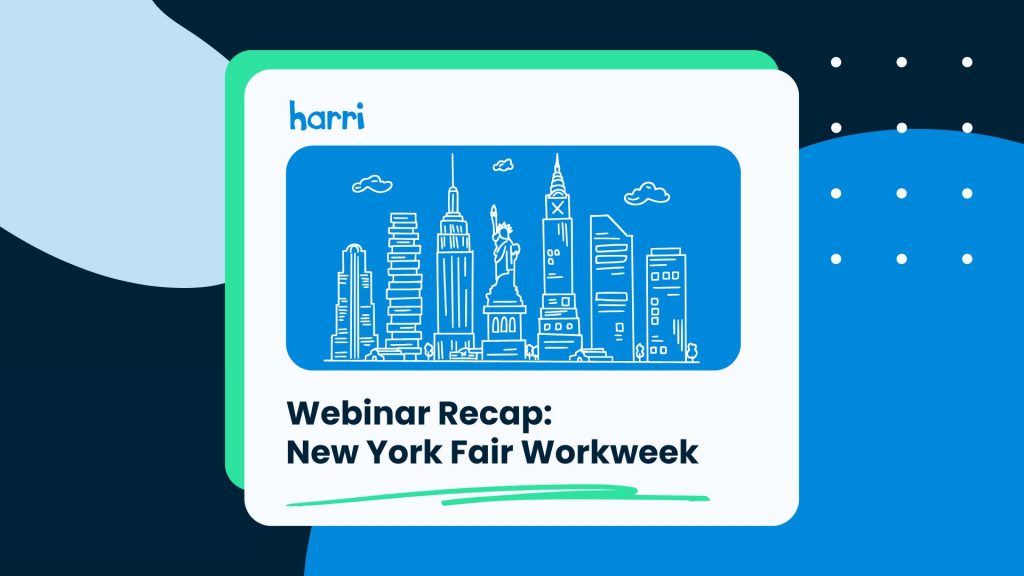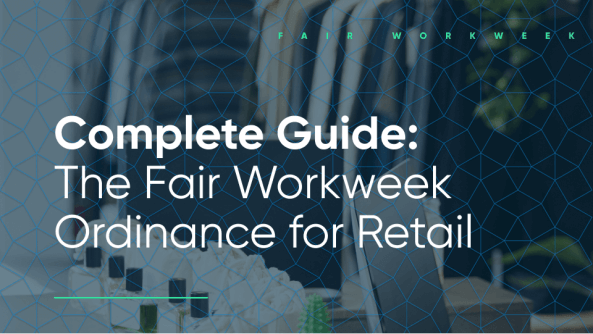Webinar Recap: Inside the NYC Fair Workweek Strategies of Shake Shack, Chopt, and Five Guys

- By Harri Insider Team | November 7, 2024
This post is not intended to be legal advice. It is to be used for summary & informational purposes only. For questions regarding NYC FWW compliance, please consult your attorney.
A Senior Compliance Leader at a National cookie franchise asked, “Do employees actually like having set schedules?” The answer: a resounding yes. Workers crave stability, and Fair Workweek (FWW) laws advocate that for employees, but for operators the real challenge is staying compliant without disrupting daily operations.
These questions are exactly why over 200 restaurant operators joined Harri’s NYC Fair Workweek Compliance Crash Course last week. With Shake Shack, Chopt, and Five Guys leading the charge, the session was full of real-world tips for navigating NYC’s strict FWW requirements—from hitting advance notice deadlines to handling last-minute schedule shifts.
The heavy-hitting panel of practitioners were joined by Glenn Grindlinger, the regional practice lead for Fox Rothschild’s Labor & Employment Department in New York City, as well as Samantha Gallagher, Harri’s dedicated head of Product compliance. Samantha’s team monitors fast-changing regulations and ensures they’re embedded within operational workflows to help restaurant teams remain compliant along every step.
Nobody wants to end up on NYC’s Employer Wall of Shame, where compliance missteps can mean hefty fines and a damaged reputation. We’ll skip the ordinance details for now (catch them at the end if you’re curious) and dive straight into real-world strategies to keep compliance efficient and on budget.





High-Stakes Fair Workweek Audits: $100 Million on the Line
Labor law expert Glenn Grindlinger didn’t mince words: “Fair Work Week does have a human error factor, and inevitably there will be some violations. Even minor ones can lead to substantial fines.” How substantial? Glenn revealed he once negotiated a staggering $100 million penalty down to just 10% of the original amount.
He also emphasized that most audits are now complaint-driven, but don’t think a single complaint means a small-scale review. “It doesn’t matter whether it’s one employee complaining about one store when you may have 100 stores within the city,” Glenn explained. The city often demands documentation for every location, and they want everything electronic, searchable, and ready to scrutinize.
Audience Question:
HR Leader at one of the largest American coffeehouse chains
“Glenn, you mentioned auditors prefer digitized records for reviews. FWW requires businesses to keep three years of records—do physical copies count, like schedules and Access to Hours records?”Answer:
In many cases, NYC Fair Workweek requirements favor digital records, but physical copies may still be acceptable depending on how information is communicated to employees.
What NYC Operators Worry About Most
With varying requirements across locations, ever-changing schedules, and complex compliance tracking, brands are finding themselves in a constant juggling act. Panelists shed light on how they’re navigating these challenges and training their teams to stay compliant in a high-stakes environment.
“Fair Work Week is the most nuanced in terms of rules,” shared Bethany, Chief People Officer at Five Guys. For a brand with locations both inside and outside NYC, meeting Fair Workweek requirements alongside other wage regulations has turned into a logistical puzzle.
“How do we document, create SOPs, and track everything in a way that makes sense?”
Beatriz Lopez, Human Resources Generalist at Chopt, highlighted the challenge of “staying compliant always” while managing the day-to-day demands of restaurant operations. “Absences contribute to you having to ask people to stay longer because you can’t compromise hospitality and customer service,” she explained. To balance both compliance and service, Beatriz emphasizes the importance of planning ahead, encouraging general managers to think two weeks in advance about both the “hospitality portion and the compliance portion… hand in hand.”
Top 5 Fair Workweek Compliance Pitfalls
NYC FWW laws are designed to protect employees from being called in for last-minute shifts or being overworked without adequate rest. They also ensure that workers know their schedules well in advance, allowing them to plan their personal lives more effectively. However, these laws can be challenging for operators to navigate and adhere to, particularly in areas like scheduling and premium payments. Understanding these five common pitfalls—and knowing how to avoid them—keeps compliance manageable and reduces costly risks.
Regular Schedule Variation
Keep schedule changes within 15% of regular hours unless employee consent is given.
Harri Advantage: Use tracking tools to monitor variations and collect approvals.
Audience Question:
Senior Compliance Leader at Multinational Coffeehouse Chain
“Does Harri capture consent when a work schedule varies by more than 15% before it’s posted? What are the best practices for managing vacation/PTO and minimizing changes to employees’ regular schedules?”Answer:
When a manager schedules an employee with a variation of more than 15% from their regular hours, Harri issues a warning, notifying the manager that consent is required. This alert appears again when publishing the schedule, ensuring that it can’t be posted without the employee’s approval. Harri’s system also allows employers to track if the change was employee-initiated, legally permitted, or manager-initiated.
Improper Scheduling Practices
Post schedules 14 days in advance to avoid premium penalties.
Harri Advantage: Scheduling alerts help managers meet the advance notice cutoff.
Failing to Automate Premium Payments
Automate premiums for schedule changes to prevent errors and missed payments.
Harri Advantage: Built-in automation for seamless premium compliance.
Audience Question:
Senior HR Leader at Hospitality Company
“How can you help General Managers recognize that premium costs, though important, are sometimes unavoidable, and guide them on strategically managing these costs in response to weekly challenges?”Answer:
Teach managers the difference between avoidable and unavoidable premium costs. Avoidable premiums, like Right to Rest violations, can be managed with proactive scheduling. On the other hand, some premiums are simply part of running a business—like when a surge in customer flow requires staff to stay past their scheduled end time.
Failing to Offer Extra Shifts to Existing Workers
Offer extra shifts to current staff before hiring externally.
Harri Advantage: Tools like the Available Shifts Pool prioritize internal opportunities.
Inadequate Record-Keeping
Digital records are essential for audit readiness.
Harri Advantage: Automated reporting keeps documentation organized and accessible.
“If you fail to offer a shift to your existing workers, the penalties can add up fast. The way the city calculates penalties is significant. Let’s say it’s $300 for failing to offer that shift—that's $300 to every employee who could have taken it but wasn't offered it."
Glenn Grindlinger
How Top Operators Train Their Teams On FWW
Each brand has devised a unique approach to educate and empower managers to meet FWW requirements without breaking stride, but… expecting your managers (who are not legal experts) to understand every nuance of the law is unrealistic and risky.
Beatriz takes a hands-on approach at Chopt, personally reviewing schedule notifications from Harri together with her GM. “We look at the warnings on the schedule together to ensure we catch potential violations early,” she explained. These sessions focus on understanding compliance alerts and evaluating daily premiums—questions like, “how much are we paying, what are the reasons, who are we paying, and how can we adjust that? And that’s definitely helped us.”
For Shake Shack, training is built into the managerial journey from day one. “Over the last couple of years, we’ve taken a three-pronged approach,” Matt Foerster, Manager of Predictive Scheduling and Compliance at Shake Shack said. This includes using Harri’s compliance reporting, an annual recertification requirement for managers, and an internal audit and control process.
Built-In Accountability and the Right Tools for Effective Compliance
Layered accountability and specialized tools play a crucial role in maintaining compliance across locations.
“We allow the general managers to create the schedule, but they can’t modify it. The DM has to modify it,” Bethany explained, adding that those extra layers of accountability make a big difference at Five Guys. “Harri was a big help with this because we can change all the settings on the backend to get granular.”
“The Shacks are checking their own level of compliance and practices every week. The area directors do that once a month, and then I do that once a quarter,” Matt shared. “I work hand in hand with anyone who has questions and specifically provide support for people who are coming in from either outside of New York City or transitioning from a full-service company over to Shake Shack.”
Mastering NYC Fair Workweek Compliance
Fair Workweek compliance in NYC is complex, but with the right approach, it’s manageable. Leaders from Five Guys, Shake Shack, Chopt, and Fox Rothschild shared practical strategies for keeping operations compliant, from proactive manager training to using technology that simplifies the process.
Want the full insights? Watch the full replay or email samantha.poff@harri.com to get access to the slides.
NYC Fair Workweek Compliance for Fast-Food and Fast-Casual Chains
NYC’s Fair Workweek (FWW) law applies to fast-food and fast-casual chains with 30 or more locations nationwide, setting strict requirements to protect hourly workers’ schedules. The law’s intent is to bring stability and predictability to work hours, requiring employers to follow specific rules around scheduling, rest periods, and compensation for last-minute changes.
Key Requirements for NYC Fair Workweek Compliance
- Advance Notice of Schedules
Employers must deliver work schedules at least 14 days before they take effect, allowing employees to plan around their shifts without last-minute disruptions. - Compensation for Schedule Changes
If an employer needs to alter a schedule within the 14-day window, they must compensate the affected employee. This includes premiums for last-minute shift changes - Guaranteed Rest Periods
Employees must have at least 11 hours off between shifts. If this rest period cannot be met, employers must secure documented consent from the employee, along with additional pay to cover the disruption. - Employee Consent for Schedule Changes
If managers add hours within the 14-day notice period, employees must consent to the change. This rule prevents last-minute shifts and protects workers from unexpected schedule demands.
In addition to advance scheduling and rest period requirements, the NYC Fair Workweek law mandates that employees receive consistent weekly schedules, providing stable and predictable hours. Workers can decline extra shifts or clopenings, protecting them from sudden schedule changes or insufficient rest. If hours become available, employers must prioritize reinstating previously laid-off employees by seniority before hiring new staff. Finally, the law prohibits employers from reducing an employee’s hours by more than 15% without a valid business reason, preventing arbitrary cuts to workers’ schedules.





















